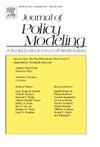在选定的欧盟国家,增加儿童保育以促进母亲就业
IF 3.1
2区 经济学
Q1 ECONOMICS
引用次数: 0
摘要
本文基于行为微观模拟模型EUROLAB(使用劳动力市场均衡模型来涵盖需求侧),提供了一组欧盟成员国中增加托儿服务可获得性的孕产妇劳动力供给效应的证据。我们的研究结果表明,实现更高的儿童保育参与率将导致3岁以下儿童的母亲的劳动力供应总体增加,这在各国之间存在差异。此外,劳动力需求方面略微缓和了最终的就业效应,但预计就业仍将较基线情况大幅上升。在匈牙利和波兰等国家,正规儿童保育和女性劳动参与率较低,对就业的预期影响可能会更高。相反,在像葡萄牙这样的国家,就业的变化则较为温和。这些发现表明,考虑到各国在劳动力市场参与和儿童保育制度方面的巨大差异,普遍的、一刀切的目标在欧盟可能并不有效。因此,建议根据欧盟各国的具体情况制定量身定制的儿童保育政策。本文章由计算机程序翻译,如有差异,请以英文原文为准。
Increased childcare to promote mothers’ employment in selected EU countries
This paper provides evidence of the maternal labour supply effects of increased childcare availability in a set of EU Member States based on the behavioural microsimulation model EUROLAB, that uses a labour market equilibrium model to encompass the demand side. Our findings indicate that achieving higher childcare participation rates would result in an overall increase in the labour supply of mothers with children below 3, with variations across countries. Furthermore, the labour demand side moderates slightly the final employment effect, but employment is still expected to rise substantially vis a vis the baseline situation. In countries like Hungary and Poland, where formal childcare and female labour participation are low, the expected impact on employment is likely to be higher. Conversely, in countries like Portugal the changes in employment are more modest. These findings indicate that universal, one-size-fits-all targets may not be efficient in the EU, given significant variations across countries in terms of labour market participation and childcare systems. Thus, tailored childcare policies that account for country-specific contexts within the EU are recommended.
求助全文
通过发布文献求助,成功后即可免费获取论文全文。
去求助
来源期刊

Journal of Policy Modeling
ECONOMICS-
CiteScore
6.20
自引率
11.40%
发文量
76
期刊介绍:
The Journal of Policy Modeling is published by Elsevier for the Society for Policy Modeling to provide a forum for analysis and debate concerning international policy issues. The journal addresses questions of critical import to the world community as a whole, and it focuses upon the economic, social, and political interdependencies between national and regional systems. This implies concern with international policies for the promotion of a better life for all human beings and, therefore, concentrates on improved methodological underpinnings for dealing with these problems.
 求助内容:
求助内容: 应助结果提醒方式:
应助结果提醒方式:


